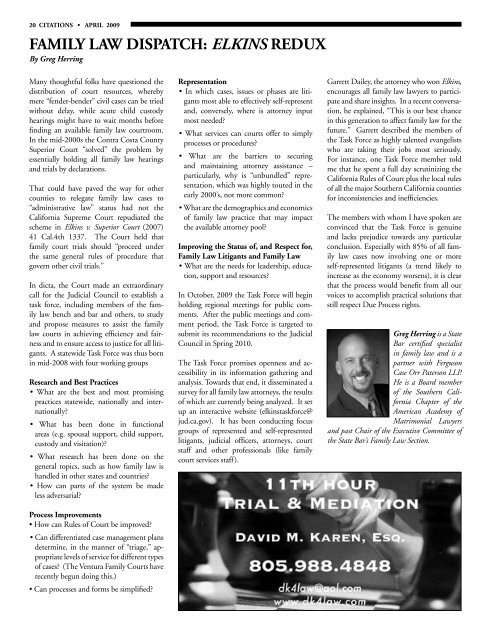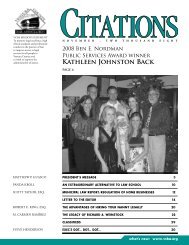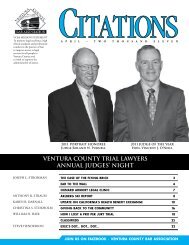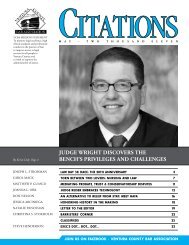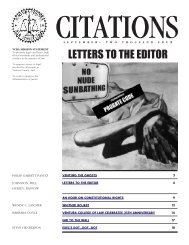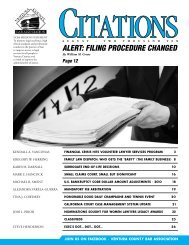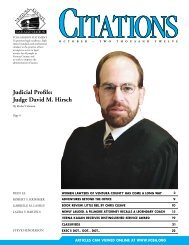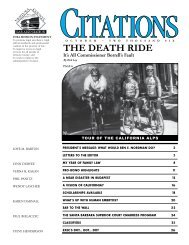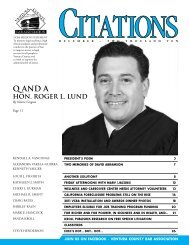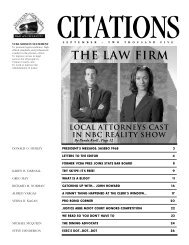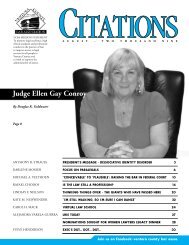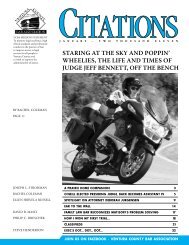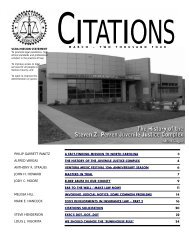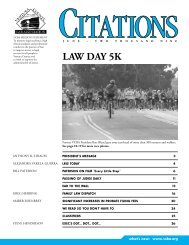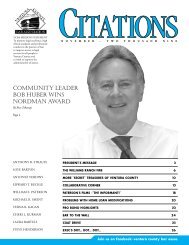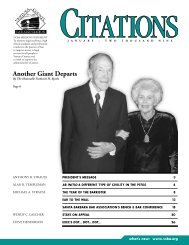Everyone likes a story. Especially if the story - Ventura County Bar ...
Everyone likes a story. Especially if the story - Ventura County Bar ...
Everyone likes a story. Especially if the story - Ventura County Bar ...
You also want an ePaper? Increase the reach of your titles
YUMPU automatically turns print PDFs into web optimized ePapers that Google loves.
20 CITATIONS • APRIL 2009<br />
fAMiLy LAW DiSPAtCH: ElKINS rEDuX<br />
By Greg Herring<br />
Many thoughtful folks have questioned <strong>the</strong><br />
distribution of court resources, whereby<br />
mere “fender-bender” civil cases can be tried<br />
without delay, while acute child custody<br />
hearings might have to wait months before<br />
finding an available family law courtroom.<br />
In <strong>the</strong> mid-2000s <strong>the</strong> Contra Costa <strong>County</strong><br />
Superior Court “solved” <strong>the</strong> problem by<br />
essentially holding all family law hearings<br />
and trials by declarations.<br />
That could have paved <strong>the</strong> way for o<strong>the</strong>r<br />
counties to relegate family law cases to<br />
“administrative law” status had not <strong>the</strong><br />
Cal<strong>if</strong>ornia Supreme Court repudiated <strong>the</strong><br />
scheme in Elkins v. Superior Court (2007)<br />
41 Cal.4th 1337. The Court held that<br />
family court trials should “proceed under<br />
<strong>the</strong> same general rules of procedure that<br />
govern o<strong>the</strong>r civil trials.”<br />
In dicta, <strong>the</strong> Court made an extraordinary<br />
call for <strong>the</strong> Judicial Council to establish a<br />
task force, including members of <strong>the</strong> family<br />
law bench and bar and o<strong>the</strong>rs, to study<br />
and propose measures to assist <strong>the</strong> family<br />
law courts in achieving efficiency and fairness<br />
and to ensure access to justice for all litigants.<br />
A statewide Task Force was thus born<br />
in mid-2008 with four working groups<br />
research and Best Practices<br />
• What are <strong>the</strong> best and most promising<br />
practices statewide, nationally and internationally?<br />
• What has been done in functional<br />
areas (e.g. spousal support, child support,<br />
custody and visitation)?<br />
• What research has been done on <strong>the</strong><br />
general topics, such as how family law is<br />
handled in o<strong>the</strong>r states and countries?<br />
• How can parts of <strong>the</strong> system be made<br />
less adversarial?<br />
Process improvements<br />
• How can Rules of Court be improved?<br />
• Can d<strong>if</strong>ferentiated case management plans<br />
determine, in <strong>the</strong> manner of “triage,” appropriate<br />
levels of service for d<strong>if</strong>ferent types<br />
of cases? (The <strong>Ventura</strong> Family Courts have<br />
recently begun doing this.)<br />
• Can processes and forms be simpl<strong>if</strong>ied?<br />
representation<br />
• In which cases, issues or phases are litigants<br />
most able to effectively self-represent<br />
and, conversely, where is attorney input<br />
most needed?<br />
• What services can courts offer to simply<br />
processes or procedures?<br />
• What are <strong>the</strong> barriers to securing<br />
and maintaining attorney assistance –<br />
particularly, why is “unbundled” representation,<br />
which was highly touted in <strong>the</strong><br />
early 2000’s, not more common?<br />
• What are <strong>the</strong> demographics and economics<br />
of family law practice that may impact<br />
<strong>the</strong> available attorney pool?<br />
improving <strong>the</strong> Status of, and respect for,<br />
family Law Litigants and family Law<br />
• What are <strong>the</strong> needs for leadership, education,<br />
support and resources?<br />
In October, 2009 <strong>the</strong> Task Force will begin<br />
holding regional meetings for public comments.<br />
After <strong>the</strong> public meetings and comment<br />
period, <strong>the</strong> Task Force is targeted to<br />
submit its recommendations to <strong>the</strong> Judicial<br />
Council in Spring 2010.<br />
The Task Force promises openness and accessibility<br />
in its information ga<strong>the</strong>ring and<br />
analysis. Towards that end, it disseminated a<br />
survey for all family law attorneys, <strong>the</strong> results<br />
of which are currently being analyzed. It set<br />
up an interactive website (elkinstaskforce@<br />
jud.ca.gov). It has been conducting focus<br />
groups of represented and self-represented<br />
litigants, judicial officers, attorneys, court<br />
staff and o<strong>the</strong>r professionals (like family<br />
court services staff).<br />
Garrett Dailey, <strong>the</strong> attorney who won Elkins,<br />
encourages all family law lawyers to participate<br />
and share insights. In a recent conversation,<br />
he explained, “This is our best chance<br />
in this generation to affect family law for <strong>the</strong><br />
future.” Garrett described <strong>the</strong> members of<br />
<strong>the</strong> Task Force as highly talented evangelists<br />
who are taking <strong>the</strong>ir jobs most seriously.<br />
For instance, one Task Force member told<br />
me that he spent a full day scrutinizing <strong>the</strong><br />
Cal<strong>if</strong>ornia Rules of Court plus <strong>the</strong> local rules<br />
of all <strong>the</strong> major Sou<strong>the</strong>rn Cal<strong>if</strong>ornia counties<br />
for inconsistencies and inefficiencies.<br />
The members with whom I have spoken are<br />
convinced that <strong>the</strong> Task Force is genuine<br />
and lacks prejudice towards any particular<br />
conclusion. <strong>Especially</strong> with 85% of all family<br />
law cases now involving one or more<br />
self-represented litigants (a trend likely to<br />
increase as <strong>the</strong> economy worsens), it is clear<br />
that <strong>the</strong> process would benefit from all our<br />
voices to accomplish practical solutions that<br />
still respect Due Process rights.<br />
Greg Herring is a State<br />
<strong>Bar</strong> cert<strong>if</strong>ied specialist<br />
in family law and is a<br />
partner with Ferguson<br />
Case Orr Paterson LLP.<br />
He is a Board member<br />
of <strong>the</strong> Sou<strong>the</strong>rn Cal<strong>if</strong>ornia<br />
Chapter of <strong>the</strong><br />
American Academy of<br />
Matrimonial Lawyers<br />
and past Chair of <strong>the</strong> Executive Committee of<br />
<strong>the</strong> State <strong>Bar</strong>’s Family Law Section.


